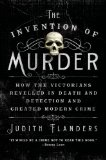Summary | Excerpt | Reviews | Beyond the Book | Read-Alikes | Genres & Themes | Author Bio

How the Victorians Revelled in Death and Detection and Created Modern Crime
by Judith FlandersThis article relates to The Invention of Murder
To paraphrase an old poem, "Twas a balmy summer afternoon," July 5, 2011 to be exact. I was enjoying a peaceful lunch with a dear friend at an outdoor cafe in Portland, Oregon, when my cell phone rang and my usually placid, always refined eighty-nine year old mother screeched: "It's not guilty on all counts, and Nancy Grace is having a cow!"
She was speaking of the Casey Anthony verdict, which had just come down after a trial that had captivated Mom and a goodly portion of the rest of the country (including yours truly!) for the better part of three years. To this day that memory has an eerie aura for me very reminiscent of an old television show hosted by Walter Cronkite called You Are There! I even remember how every broadcast began: "What kind of a day was it? A day like any other day – and you are there!"
I mention this because on that July day of my mother's epic phone call, I began to wonder why it is that otherwise respectable, law-abiding individuals on any ordinary day in any ordinary week seem so obsessed with murder, mayhem, and the more gruesome elements of life.
Most of us have heard about Jodi Arias, Andrea Yates, Son of Sam, Ted Bundy, and the O.J. verdict, and many tune in faithfully to television shows like Forensic Files, Investigation Discovery, Southern Fried Homicide, and 48 Hours. The faithful no longer wonder at the speed with which made-for-TV movies based on these sensational crimes are launched, and it goes without saying that we view every minute of them, commercials included.
 Nor is it only modern-day murder that fascinates us. There are still books being written about Jack the Ripper (I should know since I have them all!), and I, for one, continue to ask myself, "Did she or didn't she?" whenever the name Lizzie Borden comes up in polite conversation. Her house in Fall River, Massachusetts is a bed-and-breakfast now, and guests can even stay in the very bedroom where she supposedly gave her stepmother those legendary 40 whacks.
Nor is it only modern-day murder that fascinates us. There are still books being written about Jack the Ripper (I should know since I have them all!), and I, for one, continue to ask myself, "Did she or didn't she?" whenever the name Lizzie Borden comes up in polite conversation. Her house in Fall River, Massachusetts is a bed-and-breakfast now, and guests can even stay in the very bedroom where she supposedly gave her stepmother those legendary 40 whacks.
So, ladies and gentlemen of the jury, I pose my query again; "What is it that makes us scream bloody murder?" Judith Flanders begins The Invention of Murder with a delicious quote from 19th century essayist and critic, Thomas De Quincey: "Pleasant it is to drink tea with your sweetheart but most disagreeable to find her bubbling in the tea urn...[however] even more pleasant is to read about someone else's sweetheart bubbling in the tea urn!"
And I would propose that that is precisely the answer. It's that vicarious rush we feel from being present when someone unleashes their dark side that most of us keep securely buttoned up and hidden. It's the knowledge that I, too, can participate in a crime spree or a frantic chase while absolutely knowing I will be safe and secure all the while. And perhaps most important, it becomes the variety that the old proverb tells us is the spice of life, especially in a world where too many people feel their lives demoted to the humdrum.
Finally, never forget that no matter how horrible, awful, violent, and careless of life we bemoan our modern world to be, murder has been with us since time immemorial. Even the Bible only gets through three short chapters before the first murder shows up.
Picture from AViewFrom92.com
Filed under Cultural Curiosities
![]() This "beyond the book article" relates to The Invention of Murder. It originally ran in September 2013 and has been updated for the
July 2014 paperback edition.
Go to magazine.
This "beyond the book article" relates to The Invention of Murder. It originally ran in September 2013 and has been updated for the
July 2014 paperback edition.
Go to magazine.
Your guide toexceptional books
BookBrowse seeks out and recommends the best in contemporary fiction and nonfiction—books that not only engage and entertain but also deepen our understanding of ourselves and the world around us.